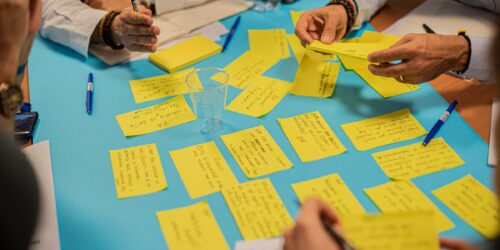
What is Community-Engaged Writing?
By Suzanne Rintoul and Brooke Pratt
Community-engaged writing refers to any curricular or co-curricular project that leverages writing about the community, for the community, or with the community (Deans, 2000). This could include everything from reporting on local issues to co-creating a community newsletter for a local non-profit to engaging in a letter-writing exchange with an at-risk population. Such projects have the potential to benefit students, faculty, community organizations, and the college itself, as they explore and enact how writing, narrative arts, and/or literacy can contribute to positive social change through community-campus collaboration, public arts initiatives, and other forms of civic engagement.

Benefits For Students
When we provide students with authentic writing assessments and projects, they can begin to see writing as a purposeful product, not just a test of skill (Young & Morgan, 2020). They are in turn more likely to consider audience and purpose as motivating factors throughout the writing and revision process (Young & Morgan, 2020). Community engagement builds empathy by encouraging students to contemplate power, positionality, and privilege (Knight, 2022) — and to acknowledge and honour the realities in their own communities (Haddix et al., 2015). Students who engage in community-based projects make meaningful connections between theory and practice and develop problem-solving and leadership skills by exploring the nature of ethical and responsible citizenship in their classes. These students then have an advantage in the workplace (Bonner Foundation Curriculum Workshop #10, n.d.).
Benefits For Faculty
For faculty, community-engaged writing projects can increase satisfaction with student learning and inspire connections and support for research (Eyler et al., 2001, p. 7). Incorporating community-engaged work in the classroom can energize faculty by enhancing interdisciplinary connections, creating foundations for innovative partnerships, and introducing new intellectual perspectives. Community-engaged writing projects also demonstrate the foundation of knowledge application in communication curriculum and help professors to ensure that their curriculum remains current (Bonner Foundation Curriculum Workshop #10, n.d.).
Benefits For the Community
Partnering with student writers can create a greater pool of resources to identify local priorities and concerns, address local issues, and create local solutions to local challenges (Bonner Foundation Curriculum Workshop #10, n.d.). By enhancing relationships with colleges and universities (Eyler et al., 2001), community-engaged writing can assist community groups reach their own organizational goals (Clarke, 2000). Such partnerships can also provide additional resources and increase capacity to impact the community and serve clients (Clarke, 2000; Driscoll et al., 1996).
Supports at Conestoga
Faculty may face a variety of barriers when planning community-engaged writing projects: insufficient resources, incentive, or reward (Eyler et al., 2001); a perceived disconnect between student writing and communities; limited understandings of student capacity to authentically help communities through writing (Garza, 2012); and constraints on time available to create and sustain community-engaged writing curriculum (Garza, 2012).
To address these challenges, The Conestoga Community-Engaged Writing Initiative (CCEWI) aims to support community-engaged writing projects that contribute ethical solutions to community problems through promoting writing and literacy as tools for public awareness, expression, and dialogue.
For more information, please contact Dr. Suzanne Rintoul and Dr. Brooke Pratt.
Suzanne Rintoul is a Communications professor and the coordinator of the Technical Communication Graduate Certificate Program in the School of Interdisciplinary Studies.
Brooke Pratt is a Communications professor and the coordinator for the Communications Department in the School of Interdisciplinary Studies.
Suggested Reading & Resources
Canadian
- Carnegie Community Engagement Classification – Canadian Pilot Cohort
- Centre for Community-Based Research (Waterloo)
- Centre for Community Engaged Narrative Arts (McMaster)
- Community Engaged Scholarship Institute (Guelph)
- Revision: The Centre for Art and Social Justice (Guelph)
American
- The Beautiful Social Research Collaborative
- The Bonner Foundation Wiki
- Centre for Community Engagement, Learning, & Leadership (Louisiana)
- Coalition for Community Writing
- House, V. (2015). Community engagement in writing program design and administration. Writing Program Administration, 39(1), 54+.
- The Writing Initiative for Service and Engagement (Colorado): see especially the “Course Planning” section of this document
References
Bonner Foundation (n.d.). Faculty development for community engaged scholarship workshop #10: Leveraging community-engaged learning for partners & publishing.
Clarke, M. M. (2000). Evaluating the community impact of service initiatives: The 3-I model. Dissertation, Peabody College, Vanderbilt University.
Deans, T. (2000). Writing partnerships: service-learning in composition. NCTE.
Driscoll, A., Holland, B., Gelmon, S., & Kerrigan, S. (1996). An assessment model for service-learning: Comprehensive case studies of impact on faculty, students, community, and institution. Michigan Journal of Community Service Learning, 3(1). https://doi.org/http://hdl.handle.net/2027/spo.3239521.0003.107.
Eyler et al. (2001). At a glance: What we know about the effects of service-learning on college students, faculty, institutions and communities, 1993- 2000: third edition. Higher Education. 4(1). The Impact of Service-Learning on College Students (umich.edu)
Garza, S. (2012). ‘Why are you making me do this?’ An examination of student attitudes toward writing with the community service-learning projects. In I. Baca (Ed.), Service-learning and writing: paving the way for literacy(ies) through community engagement (pp.73-82). Brill.
Haddix, M., Everson, J., & Hodge, R. Y. (2015). “Y’all Always Told Me to Stand Up for What I Believe In”: 21st-century youth writers, activism, and civic engagement. Journal of Adolescent & Adult Literacy, 59(3), 261–265. https://doi.org/10.1002/jaal.474.
Knight, A. (2022). Community is the way: Engaged writing and designing for transformative change. UP of Colorado.
Young, D. D., & Morgan, R. (2020). The impact of critical community-engaged writing on student understanding of audience. Composition Studies, 48(3), 35–164.









